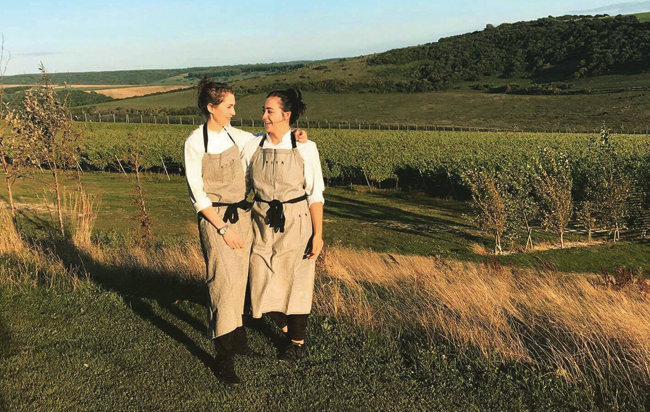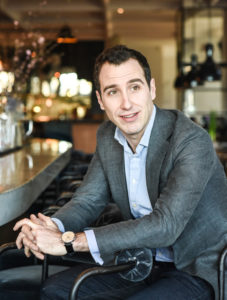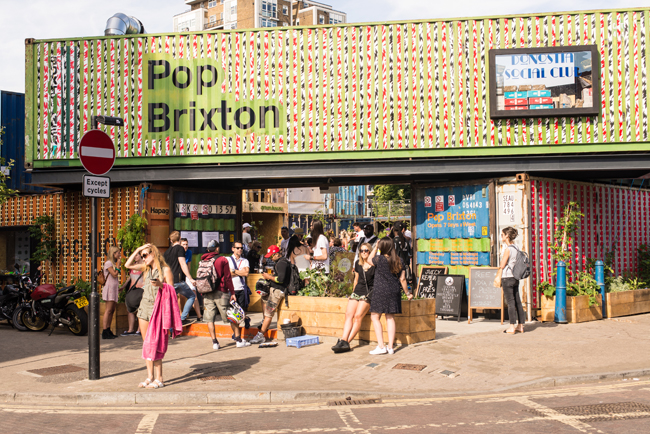5 steps to business investment
You've got a fledgling restaurant concept that customers love, but you need investment. Where can you go to find it, what are investors looking for and how should the relationship work? Neil Gerrard investigates
It's more than two years since Luke Johnson, the UK hospitality market's answer to Warren Buffett, told an audience at the 2016 Casual Dining Show in London that "storm clouds are gathering".
In what now looks like pretty sage advice, he warned: "Now is not the time to be signing the really crazy rental deals and taking on very high levels of leverage". He also suggested that restaurant groups be "somewhat more thoughtful about one's expansion plans".
The reckoning came eventually, with 2018 proving to be a bit of an annus horribilis for those brands that didn't heed Johnson's words. So where does that leave you, if you are a hungry young entrepreneur with a great restaurant concept, one that might have already done well as a pop-up or as a successful residency, and you're looking for investment to grow?
Not in as bad a place as you might think. Even in 2016, Johnson said he still had an appetite to invest, and the consensus among his fellow investors seems to be that there are still great opportunities for tenacious operators who are onto something special.
"The restaurant market is a disaster at the moment. There is no way of sugar-coating that," says Chris Miller, founder of investment business White Rabbit Fund and one of the investors to appear on BBC TV show Million Pound Menu. Following the screening of the first series earlier this year, a second has just been commissioned.
He continues: "But there has never been such a good opportunity as now to be doing what I am doing." A year ago Miller was fighting 20 different people for a restaurant property in London's Soho. Now that figure has reduced significantly.
emy Roberts, chief executive of restaurant group Living Ventures, who appeared as one of Miller's fellow investors on Million Pound Menu and ended up backing start-up brand Finca (see panel below) also sees opportunities, so long as you are prepared to play the waiting game. "If your product is in the casual dining sector, then it is tough and you will have to be very careful about where you go. But you have the opportunity to look at all those places that are closing down, some of which will be perfect. It is about choosing your moment," he says.
So if the state of the market shouldn't discourage you, what are the key things to consider when seeking restaurant investment?
Where do you find an investor?
uld you launch a crowdfunding campaign, find a deep-pocketed individual, get yourself in front of a venture capital firm, or ring your bank manager? The number of different possible routes can look bewildering.
"You need to try and meet as many people as you can and then go with your intuition," advises Darrel Connell, partner at Imbiba, an investment firm that backs Sam Lee and Neil Rankin's Temper and specialises in helping hospitality start-ups and small firms to grow.
"You have to kiss as many frogs as you can. It is unlikely, unless you are very good, that you're going to have many offers to consider," he says.
There is one route, though, that he implores young businesses not to contemplate: "There are many instances in this sector where would-be entrepreneurs have been backed by people with no real experience, who are potentially doing it for the wrong reasons, but who like the vanity of saying at a dinner party, ‘I own a restaurant'. That would be the one type of investor I would seek to avoid," he says. He advises companies to set their objectives right from the start and ask the question ‘what are we trying to do here?' before partnering with anyone at all.
What are investors looking for?
He also wants to see something scaleable. "You need a concept strong enough that it will grow in a flexible way. That doesn't mean rolling out 30-40 restaurants a year - in fact, I believe those days are gone - but if you take a business like Kricket, it has one site in Soho with a big open kitchen that fits well there, the one in Brixton is built more like a bar because it is more wet-led there, and the one in Television Centre in White City in west London is much more all-day dining."
Roberts and Connell both make the point that whatever the business is, it has to be new, different and show it has potential. Connell asserts: "Having a 'me too' product simply isn't good enough when the market is tough. Recently, we invested in a business called Vagabond, which is a wine bar with machines that allow you to try 120 different bottles of wine. The experience is a very big part of it. But will customers walk past four or five other restaurants just to get to yours?"
estors also like operators who are ready to demonstrate exactly how the business will function, says Rasha Khawaja, founder of Toucan Ventures, which offers creative companies investment combined with an experienced mentor and supports, among others, Adam Handling's the Frog.
"There is a culture out there of 'fund me now, and I will be successful.' It is interesting because investors don't invest off the bat - they look at the business plan and at how they can construct the business so it is perfect before they invest. They will question you, and you need to be prepared," she says.
How do you structure a deal?
When investing in a start-up, Imbiba, a specialist investor in the UK hospitality industry, always takes the Enterprise Investment Scheme route, which offers tax relief if your company has less than £15m of assets (for more information, see www.gov.uk/guidance/venture-capital-schemes-apply-for- the-enterprise-investment-scheme). Many investors tend to use this scheme in the early stages of a hospitality business's life and, because participants have to follow a set of rules, it doesn't allow for the structure of deals to become overly complicated.
"For a young business it is important to have a simple capital structure that everyone understands," explains Connell.
Toucan Ventures also tends to structure deals under the Seed Enterprise Investment Scheme or Enterprise Investment Scheme. But it is important that operators get to grips with the detail involved in making a concept work in the real world.
waja says: "There can be an interesting discussion at some point, when you pair the creative concept with the reality of a business. You have to get quite granular. I really enjoy that, but some find it a slow and frustrating process because there is a lot of paperwork. Every deal is different, but you need to have extreme patience talking through how to execute a concept. Most people think it's a two-week process when in fact it takes much longer."
She is an advocate of giving a business what she calls a "run rate", so if it needs £500,000 to grow, the operators should aim to secure more cash in order to give them a few more months to get the concept right and avoid falling into what she calls the "death valley" of start-ups.
Miller wants to ensure that the founder retains a decent stake so they are fully incentivised to turn it into a multimillion-pound business. He also employs "success ratchets", where the founder claws back a bit of equity when the company hits certain targets. "The other way I structure them is to make sure there is a clear distinction between who controls what and ultimately who takes what," he adds.
How do you build a partnership?
"It is imperative that you get the right partner. Business history is littered with the wrong kind of partnerships," Roberts asserts. "It's very trite but very true to say that you have to work with nice people."
Khawaja underlines how important it is to build trust between investor and operator. "We believe in supporting the business all the way, so for us it is fundamental that we have a key relationship with the founders and the management and, like any relationship, it takes time," she says.
The ability to communicate effectively and be honest with each other is fundamental for Connell. Imbiba is assiduous in conducting due diligence and references on the people it is considering working with and he urges operators to do the same with their investors.
Miller adds: "I can guarantee there will be arguments along the way and you have got to understand why people are doing it so that you both start the journey with the same intent. I looked at one investment and I asked them where they wanted to be in five years' time and they wanted to be on a beach somewhere, having sold the business. That's fine, but it's not what I am looking for."
Where are the opportunities?
"Plant-based is a hugely interesting phenomenon and the fastest-growing lifestyle in the UK at the moment," Miller says. "And there are a couple of great places like Caravan or the Hoxton that have done all-day dining well but there is still room for more good operators."
For Connell, it is less about a specific trend and more about anything that offers consumers an engaging experience. "Fun and experience are the biggest trends we see," he says. "People share their experiences on Instagram. Dishoom does it brilliantly, as does Soho House."
Khawaja sees developments like Pop Brixton and Boxpark, that simultaneously offer consumers an attractive destination to visit and operators a cheaper and more flexible way of running a site, as becoming a more important part of the mix. Toucan Ventures is in the process of buying a property in London's Battersea, set to be called the Nest, where all of the projects it works with are housed in one space to help cultivate creative talent.
"I think concepts like Pop Brixton, Boxpark and the Nest are really going to take over and help the high street. That is where the future is," she says.
Prepare your business caseBe different - you need a new and different concept that stands out. Good food alone isn't good enough. Be obsessed - passion and creativity are key to a successful concept. Be nice - investors want to do business with people they get on with. Be patient - do your research, as not all opportunities are what they seem. Be scaleable - you will have to be able to follow systems if you want to grow significantly. Be open to advice - listening to an experienced operator can be invaluable. Be realistic - restaurant businesses don't tend to generate huge valuations. Be sensible about what your business is worth. Be ready to work hard - winning investment is just the start.
'Million Pound Menu' success storiesFinca !joe-earnshaw-oli-smith-michael-harrison](https://cdn.filestackcontent.com/h5jDM0eQAAayBVoXX1aQ)Liverpool-based Cuban street food pop-up Finca may have started small, but its four young founders, Joe Earnshaw, Michael Harrison, Daniel Heffy (currently working in Stockholm) and Oli Smith, have dreamt big from the start. "The vision was to make something of it from the first day we started trading," says Earnshaw. "We'd been trading for about 18 months and people loved it. We were getting lots of opportunities, but we wanted our own premises." After Thom Hetherington, chief executive of Northern Restaurant and Bar, advised the team that the best investor would be an experienced operator, they decided to avoid crowdfunding schemes, despite their popularity. Instead, they spotted the opportunity to take part in *Million Pound Menu* and applied. After impressing the judges, they won around £150,000 in investment from Jeremy Roberts. "The most exciting thing about working with Jeremy is his experience," says Earnshaw. "When you are looking for an investor, you are not looking for a pot of money. If you are putting blood, sweat and tears into your business - you want someone who has done the same thing." Finca took up a residency at the 50-cover café bar in Living Ventures' Artisan in Manchester during the summer until the end of August. Roberts says: "They have enjoyed it and it has been enormously helpful for them to work with a larger business that has a lot of the systems that they are going to need themselves." The aim now is to gradually roll the business out, targeting Liverpool, Leeds and Manchester." Epoch  For Ritz London hotel alumni, sommelier Emily Lambert and chef Ruth Hansom, the path from creating their modern British restaurant concept, Epoch, to finding an investor was something of a whirlwind. "It was a fresh idea, but we knew it had longevity and potential," says Lambert. "We saw the chance to apply for the show and just went for it." Such was their speed that the pair hadn't even produced a business plan and didn't really have time to consider any other routes to funding. Had the programme not come up, Lambert said, they would have tried to use their connections in the hospitality industry to find an investor. As with Finca, they were looking not just for money, but for a mentor. "We wanted someone passionate about the industry who wanted to bring our concept to life. There were a few people saying, 'you should do this instead' and open multiple restaurants. We wanted someone from a fine dining group who has been on our side of the industry." Chef and restaurateur Atul Kochhar stepped up to back the pair. At the moment, they are looking for sites, but even with reduced competition in a tougher trading environment, it is not easy. "Even though we have a £1m investment, a lot of the places are just too expensive," Lambert explains. "We are now looking at places like Brixton or Clapham Common, which are up and coming but cheaper." In the meantime, Lambert and Hansom have found management roles working for other people - as head sommelier/assistant restaurant manager at the Clock House in Ripley, Surrey, and head chef at Wernher restaurant at the Luton Hoo Hotel respectively - until they can get Epoch off the ground. They aim to open in summer 2019. [Chef profile: Ruth Hansom >>](/articles/498644/chef-profile-ruth-hansom) [Million Pound Menu: Five things we learnt about Ruth Hansom and Emily Lambert's restaurant Epoch >>](/articles/528606/million-pound-menu-five-things-we-learnt-about-ruth-hansom-and-emily-lamberts-restaurant-epoch) [Million Pound Menu's Finca announces Manchester residency >>](/articles/529079/million-pound-menus-finca-announces-manchester-residency) [Get The Caterer every week on your smartphone, tablet, or even in good old-fashioned hard copy (or all three!).
Continue reading
You need to be a premium member to view this. Subscribe from just 99p per week.
Already subscribed? Log In













